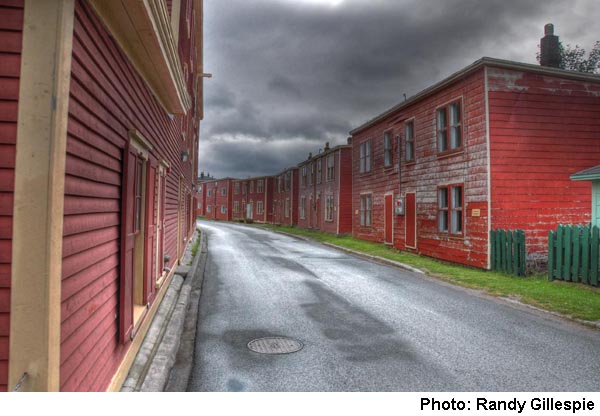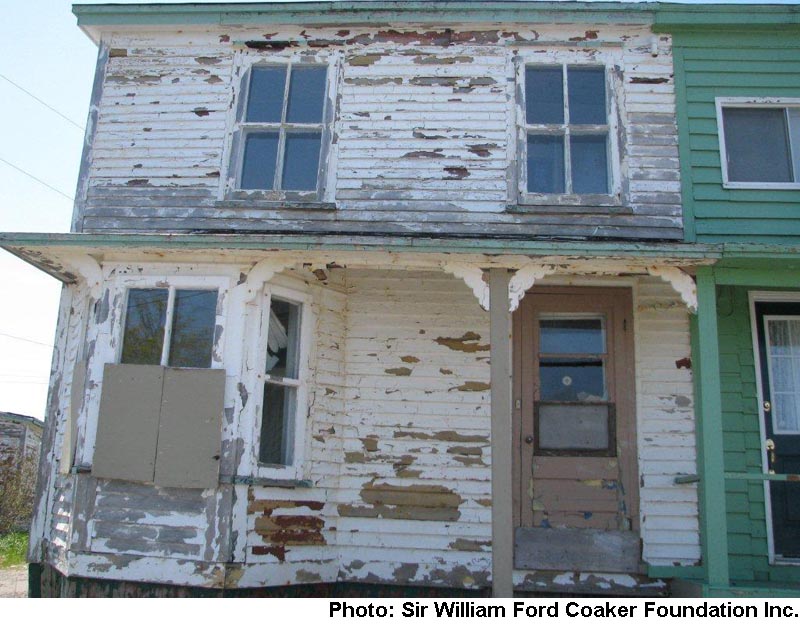
Fisherman's Row Houses
 Fisherman’s Row Houses, Port Union, Newfoundland and Labrador — ABSENTEE OWNERS THREATEN TO TURN HERITAGE HOUSES INTO DISTANT MEMORY
Fisherman’s Row Houses, Port Union, Newfoundland and Labrador — ABSENTEE OWNERS THREATEN TO TURN HERITAGE HOUSES INTO DISTANT MEMORY
Integral to Port Union National Historic Site, the Fisherman’s Row Houses remain a physical manifestation of the Fisherman’s Protective Union’s legacy. Neglected for years by their absentee owners, they are succumbing to the elements of outport Newfoundland and Labrador. Wanting to conserve their heritage value, local heritage advocates also see the structures as providing much needed affordable housing for the area.
Why they matter
Located on the shores of Trinity Bay, Port Union is a small community built in a flurry of construction starting in 1916. It is the only "union-built town" in North America. William Ford Coaker and the members of the Fishermen's Protective Union (FPU) settled the town with the aim of developing a new type of commercial and economic footing for Newfoundland's fishermen by reducing their dependency on the St John’s merchant controlled credit system
The row houses were constructed by the FPU to provide affordable housing for the workers/members who moved to Port Union to work in the Union business.
R ow housing in outport Newfoundland and Labrador is quite rare. The FPU’s concern to provide decent accommodations for its workers is reflected in the duplex row housing throughout the community. These wood frame homes are vernacular in appearance with a functional design: two central doors, each flanked by a window, and four windows on the second storey with small porches at the rear. There was community wide electricity and running water, which were services only seen in St. John’s at the time.
ow housing in outport Newfoundland and Labrador is quite rare. The FPU’s concern to provide decent accommodations for its workers is reflected in the duplex row housing throughout the community. These wood frame homes are vernacular in appearance with a functional design: two central doors, each flanked by a window, and four windows on the second storey with small porches at the rear. There was community wide electricity and running water, which were services only seen in St. John’s at the time.
Port Union was designated as a national historic site in 1998 and a provincial heritage district in 2007.
Why they’re endangered
The Sir William F. Coaker Foundation has made a tremendous effort to restore several properties in Port Union, but the Foundation does not own these row houses. The absentee owner, the Aaron and Ella Bailey Trust, is controlled by two people living in in London, Ontario. Lack of maintenance and repair work over the years has left the story and legacy of the union members who made the town are now in jeopardy.
Where things stand
The houses are in terrible shape, especially since Hurricane Igor hammered the island in September of 2010. Many of the houses are sagging and in need of immediate stabilization. The entire side of one house is bowed outwards and ready to collapse. The Coaker Foundation has shown great interest in restoring the houses and using them as affordable housing, which is in short supply. Members of the community would like to see the houses’ architectural integrity restored as they are an integral part of the area’s unique and rich history. Ongoing negotiations with the absentee owners have yet to result in a solution that could lead to the houses’ preservation.
